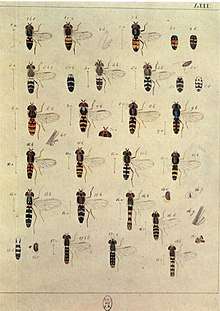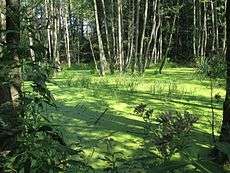Meligramma guttata
Meligramma guttata is a Holarctic species of hoverfly.[1][2]
| Meligramma guttata | |
|---|---|
 | |
| Meligramma guttata in Meigen Europäischen Zweiflügeligen (figure 15) | |
| Scientific classification | |
| Kingdom: | |
| Phylum: | |
| Class: | |
| Order: | |
| Family: | |
| Subfamily: | |
| Tribe: | |
| Genus: | |
| Species: | M. guttata |
| Binomial name | |
| Meligramma guttata (Fallén, 1817) | |
| Synonyms | |
|
| |
Description
External images For terms, see: Morphology of Diptera. Wing length 5 · 25–7 mm. Antennae black. Tibiae 1 and tarsi 1 partly dark-coloured. Thorax dorsum with 2 yellow spots just before scutellum, (which may be absent in the male). Marks on tergites 3 and 4 rectangular. The male genitalia are figured by Hippa (1968).[3] Larva described and figured by Rotheray (1994).[4]
Distribution
Palearctic: Fennoscandia South to the Pyrenees. Ireland East through North Europe and Central Europe into European Russia, the Russian Far East and Siberia to the Pacific coast (Sakhalin); Nearctic: from Alaska to Arizona.[9][10] [11]

Biology
Habitat: Deciduous forest, field hedges with mature Fraxinus, mature Salix and Alnus carr.[12] Flowers visited include white umbellifers, Epilobium angustifolium, Euonymus, Filipendula, Frangula alnus, Galium, Solidago.[13] The flight period is June to August.
References
- Stubbs, Alan E.; Falk, Steven J (1983). British Hoverflies: An Illustrated Identification Guide (2nd ed.). London: British Entomological and Natural History Society. pp. 253, xvpp. ISBN 1-899935-03-7.
- Ball, S.G.; Morris, R.K.A. (2000). Provisional atlas of British hoverflies (Diptera, Syrphidae). Monks Wood, UK: Biological Record Centre. pp. 167 pages. ISBN 1-870393-54-6.
- Hippa, H. (1968) A generic revision of the genus Syrphus and allied genera (Diptera: Syrphidae) in the Palearctic region, with descriptions of the male genitalia. Acta Ent.Fenn., 25: 1-94.
- Rotheray G., 1993 Colour Guide to Hoverfly Larvae Diptera, Syrphidae in Britain and Europe Dipterists Forum pdf
- Van Veen, M. (2004) Hoverflies of Northwest Europe: identification keys to the Syrphidae. 256pp. KNNV Publishing, Utrecht.addendum
- Van der Goot, V.S. (1981). De zweefvliegen van Noordwest - Europa en Europees Rusland, in het bijzonder van de Benelux. KNNV, Uitgave no. 32: 275pp. Amsterdam.
- Bei-Bienko, G.Y. & Steyskal, G.C. (1988). Keys to the Insects of the European Part of the USSR, Volume V: Diptera and Siphonaptera, Part I. Amerind Publishing Co., New Delhi. ISBN 81-205-0080-6.
- Coe, R.L. (1953). "Diptera: Syrphidae". Handbks. ident. Br. insects 10(1): 1-98. R. ent. Soc. London. pdf
- Fauna Europaea
- Peck, L.V. (1988). "Syrphidae". In: Soos, A. & Papp, L. (eds.) Catalogue of Palaearctic Diptera 8: 11-230. Akad. Kiado, Budapest.
- Vockeroth, J.R. (1992). The Flower Flies of the Subfamily Syrphinae of Canada, Alaska, and Greenland (Diptera: Syrphidae). Part 18. The Insects and Arachnids of Canada. Ottawa, Ontario: Canadian Government Pub Centre. pp. 1–456. ISBN 0-660-13830-1.
- Speight, M.C.D. (2011). "Species accounts of European Syrphidae (Diptera)" (PDF). Syrph the Net, the database of European Syrphidae. 65: 285pp.
- de Buck, N. (1990). "Bloembezoek en bestuivingsecologie van Zweefvliegen (Diptera, Syrphidae) in het bijzonder voor België". Doc. Trav. IRSNB, no. 60, pp. 1-167.